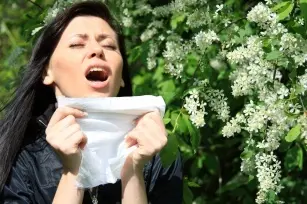
In Poland, 25% of the population suffers from this troublesome form of allergy. By medical experts called allergic rhinitis, the ailment gives very unpleasant symptoms. These are: a troublesome runny nose, irritated and watery eyes, a feeling of scratching in the throat, as well as lack of concentration and sleep problems. Colloquially speaking, allergy sufferers have very big problems with everyday functioning. Let’s dispel the myth that such a runny nose has to be waited out. Absolutely not!, it should be treated as soon as possible.
Laryngologists emphasize that a runny nose lasting more than 10 days requires medical intervention. sources hay fever there may be a couple; pollen of grasses, plants, trees, wool, hair of various animals, fungal spores.
Allergy treatment is very difficult because the allergens I am writing about are unfortunately impossible to eliminate. Therefore, the primary goal is to treat by alleviating or striving to completely subside the ailments. The first step in treating hay fever is to conduct blood or skin allergy tests. Very often, the so-called nasal swab, which allows you to determine the amount of eosinophils; a large number of them confirms the presence of hay fever. When it comes to the predisposition to hay fever, two factors are of primary importance. Genetic and the frequency with which we come into contact with a specific allergen. When the body comes into contact with an allergen, its mast cells are stimulated to secrete histamines and inflammation begins. The mucous cells are thus stimulated to increase mucus stimulation in the body.
Treatment of allergies
Antihistamines is an option when we cannot avoid the presence of causing allergens hay fever. Two weeks before the pollen season, we take appropriate measures that will block the histamine that our body secretes, causing unpleasant symptoms such as sneezing, burning and howling from the nose. The solution is also special drops that we use to moisturize the nose each time after a walk in the fresh air and contact with allergens. They contain corticosteroids to prevent the occurrence of tiring symptoms or at least to slow down their acute intensity. Unfortunately, these agents, both steroids and antihistamines, are not indifferent to the body and cause unpleasant ailments. Their tolerance level varies. Drowsiness, lack of concentration and fatigue prevent many people from using these pharmacological agents.
Desensitization, called in medicine specific immunotherapy IT, consists in administering vaccines with a dose of the allergen to which the patient is allergic. Appropriately early use of such a method of desensitization gives a very good chance of desensitization. However, like any type of treatment, it is not for everyone. There are also contraindications to the use of this therapy.
Currently, there are natural substitutes that support us in the fight against hay fever. They are:
- Quercetin is a strong plant pigment that prevents the release of histamine, which causes troublesome ailments for allergy sufferers. We find it in lettuce, citrus fruits, apples and onions
- Vitamin C also, according to proven scientific research, effectively and quickly reduces the level of histamine in our body
- Butterbur as a natural plant is very effective in treating catarrh and, most importantly, does not give such unpleasant ailments as the feeling of fatigue and drowsiness
- Green tea, due to the content of catechins, can also free us from the increased effects of allergens.









